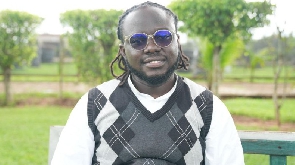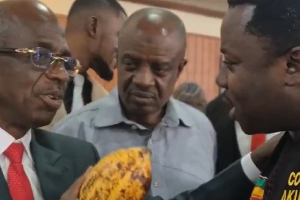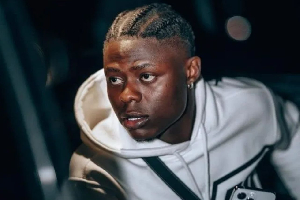Di view of di Pacific Ocean, as you dey pass third mainland bridge for Lagos, Nigeria, na nothing short of captivating. Di waves dey clap for di coastline, to create one gigantic, calming pool of wonder. But for me, dis no always be di case; for one point, e dey serve as reminder of misery and everytin wey bad.
Meet Toluse Francis, one 35-year-old mental health professional and counsellor, from Lagos, Nigeria. Dis na im journey out of di bottom of depression. Despite wetin many dey tink say "healers'' dey immune to mental health challenges, Toluse experience show otherwise.
For late 2020, Wen Covid-19 pandemic dey high, Toluse begin notice one gradual loss of interest for many aspects of life. E dey avoid social outings, suffer from insomnia, and get little appetite. Loneliness come become im constant companion. Soon, im mind don grow cover for darkness, and e dey consider to end am all.
Globally, one pesin dey take dia own life every 40 seconds, e pass annual war-related deaths.
According to one 2019 World Health Organization (WHO) report, Africa carry di world highest suicide rate.
Statistics show say for Africa, e get one psychiatrist for every 500,000 inhabitants, 100 times less dan wetin WHO recommend. Wit such pressure on services, Toluse journey highlight one key kwesion: "Who be di therapist own therapist?"
Toluse first dey overlook di signs of im own suffering. E dey struggle wit weda make e seek help, wit one kind worry say, "Toluse Francis, pipo dey come to you for help; who you go go meet for help?"
However, for December 2021, e bin find imself for di grip of serious depression and big suicidal thoughts. Desperately, e bin reach out on im WhatsApp status, to declare say, "I tink say time don reach for me to dey rescued." Na one ogbonge turning point wen friends bin rally to im side, to offer support throughout di night.
To describe im feelings become one great challenge. Toluse bin tell im friend, e admit say, "I really no sabi wetin dey go on wit me." Di friend bin encourage am to seek professional help, wey make Toluse to make dat ogbonge call to one psychiatrist. E mark di start of im journey to recovery.
Toluse dey tok am say nobody truly wish to die; one simple call or intervention fit offer pesin new perspective on life. E say im experience highlight three common triggers for depression and suicidal thoughts: relationship breakdowns wey lead to low self-esteem and shame, financial crises sake of economic hardships, and unresolved past traumas.
Within im professional circle, Toluse sometimes dey hear say, "one therapist need one therapist." As therapists dey carry di emotional burdens of odas, dem, too, need one outlet for dia own struggles. Na healthy, cyclical process say, for Toluse case, dey disrupted by isolation, wey make im depression worse.
To seek help prove to be one humble experience for Toluse, as e pity im clients' difficulties wen dem dey try express dia inner turmoil. Above all, E no get direct treatment for suicidal thoughts; instead, professionals dey address di underlying mental health conditions, like depression.
For Toluse severe case, therapy alone no dey enough; medication become one vital component for im recovery. E underscore di difference: medication dey address biology, while therapy dey target thought processes and perceptions. Though medication fit dey addictive and affect bodi metabolism, Toluse maintain a healthy perspective, wey prevent dependency.
To help im healing, Toluse bin implement lifestyle changes. E pay attention to im diet, make sure say e dey get enof sleep, increase social interactions, and take one four-month break from work, e no see clients.
Some pipo bin suggest say im clients' "evil spirits" don transfer dia depression to am, one belief wey Toluse deny sake of say e no get scientific proof. Im message dey clear: regardless of beliefs, professional medical assistance be di topmost.
Toluse tok say im survival demonstrate say e dey important to seek professional help wen pesin dey struggle wit mental health challenges.
E discourage self-diagnosis through internet, as online articles fit make pesin condition worse, e repeat say e dey important to reach out to a compassionate contact for your phone wey fit no fully understand but fit guide you to help.
Suicidal thoughts sometimes dey make you feel say you dey cut off, convince you say to end am all na di only solution. Toluse advice say: "no stay on those thoughts; dismiss dem, and if you no fit, seek professional help." E underscore our power to control our thoughts, e urge us to arrest and throway harmful ones and advocate for one growth mindset and contentment wit pesin personal life journey.
In summary, for any pesin wey dey battle mental health challenges, Toluse offer two words of wisdom: "no go [through] am alone; speak up."
Toluse transformative journey don forever change im perspective on im profession. While e fit no fully understand wetin odas dey experience, e fit relate to am sake of say e don go through am imself.
If you or somebodi wey you sabi dey struggle wit mental health issues or suicidal thoughts, please seek help. You fit speak to one health professional or one organisation wey dey offer support.
Details of help dey available for many oda kontries for Befrienders Worldwide. www.befrienders.org
For di UK, list of organisations wey fit help dey available for bbc.co.uk/actionline
Data research and analysis by Brian Osweta.
BBC Pidgin of Sunday, 10 September 2023
Source: BBC
















